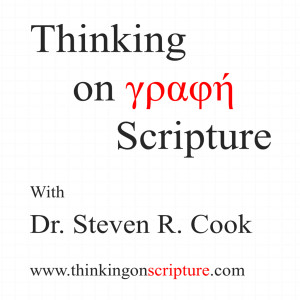
Thinking on Scripture with Dr. Steven R. Cook
Religion & Spirituality:Christianity

[Note: It was brought to my attention that I sounded barky and maybe a little angry on this lesson. Please know I was not angry, and I apologize if the tone seems that way. I pray the content gets through, even if the delivery is a bit stronger than my other lessons. Thank you. :-) ]
In this pericope Zechariah was instructed to perform a symbolic coronation in which he placed a regal crown on Joshua, the high priest, who is a type of Christ, who is both King and Priest, and will build the future millennial temple. The Lord commanded Zechariah to meet three returnees from Babylon and take an offering from them, namely Heldai, Tobijah and Jedaiah (Zec 6:9-10a). These were staying at the house of Josiah the son of Zephaniah (Zec 6:10b), who later is called “Hen” (Heb. חֵן Chen), which means gracious one (vs. 14). From these three men Zechariah was to “Take silver and gold, [and] make an ornate crown” (Zec 6:11a). The word crown is a translation of the Hebrew word עֲטָרָה atarah, which is used only for royalty (2 Sam 12:30; Psa 21:3). The high priest also wore a crown (Heb. נֶזֶר nezer), but it was different (Exo 29:6; 39:30). Zechariah was commanded to do something that had never occurred before; he was to take this royal crown and “set it on the head of Joshua the son of Jehozadak, the high priest” (Zec 6:11b). We must remember that Zerubbabel was a descendant of King David (1 Chr 3:17–19; Matt 1:12) as well as the governor of Judah (Hag 1:1), and legally the rightful person to wear the king’s crown. However, God was using Joshua as an object lesson concerning Jesus, Israel’s future Ruler, who is both King (2 Sam 7:8-16; Psa 89:3-4; 34-37; Isa 9:6-7; Jer 23:5; Mic 4:1-3; Luke 1:26-33) and Priest (Psa 110:1-4; Heb 4:15; 5:6; 7:1-3, 11-21). God spoke through Zechariah, saying, “Thus says the LORD of hosts, ‘Behold, a man whose name is Branch, for He will branch out from where He is; and He will build the temple of the LORD’” (Zec 6:12). The term Branch is a Messianic title that refers to Jesus Christ as Ruler in the line of David (Jer 23:5; 33:15); however, in this context, it reveals Him in His role as Priest. This will occur during the millennial reign of Christ. God then tells Zechariah, “Yes, it is He who will build the temple of the LORD, and He who will bear the honor and sit and rule on His throne. Thus, He will be a priest on His throne, and the counsel of peace will be between the two offices” (Zec 6:13). Jesus will unite the two offices of King and Priest. After the symbolic coronation ceremony, God told Zechariah to remove the crown from Joshua, saying, “Now the crown will become a reminder in the temple of the LORD to Helem, Tobijah, Jedaiah and Hen the son of Zephaniah” (Zec 6:14). This crown was to remain in the temple as a constant reminder of what God would do in the future for His people. In this way, the crown was an encouragement to all who saw it and recognized its significance; a crown that belonged to Israel’s future Ruler. Finally, addressing Zechariah’s generation, the Lord said, “Those who are far off will come and build the temple of the LORD. Then you will know that the LORD of hosts has sent me to you. And it will take place if you completely obey the LORD your God” (Zec 6:15). Those who were “far off” referred to Jewish exiles who were still returning to Jerusalem, who would come and help “build the temple of the LORD.” This would have encouraged those in Zechariah’s day to keep working, because God was helping them. The work performed by the returnees validated Zechariah’s ministry, confirming He’d been sent by the Lord. However, being the covenant people of God, these Israelites were obligated to resume their walk with God and obey His word; therefore, Zechariah states, “And it will take place if you completely obey the LORD your God.” This was a reminder about their obligation to the Mosaic covenant and the conditions of blessing and cursing written in it (Deu 28). Though the success of the rebuilding of the temple in Zechariah’s day was conditioned on their obedience to the Mosaic Law, Israel’s future success—both national and religious—is ultimately conditioned on the reign of Messiah, who cannot fail.
More Episodes
 2024-11-03
2024-11-03
 31
31
 2024-08-31
2024-08-31
 75
75
 2024-08-24
2024-08-24
 92
92
 2024-08-17
2024-08-17
 85
85
 2024-08-10
2024-08-10
 89
89
 2024-08-03
2024-08-03
 100
100
 2024-07-27
2024-07-27
 117
117
 2024-07-20
2024-07-20
 117
117
 2024-07-13
2024-07-13
 163
163
 2024-07-06
2024-07-06
 136
136
 2024-06-29
2024-06-29
 124
124
 2024-06-22
2024-06-22
 134
134
 2024-06-15
2024-06-15
 123
123
 2024-06-08
2024-06-08
 111
111
 2024-06-01
2024-06-01
 142
142
Create your
podcast in
minutes
- Full-featured podcast site
- Unlimited storage and bandwidth
- Comprehensive podcast stats
- Distribute to Apple Podcasts, Spotify, and more
- Make money with your podcast
It is Free
- Privacy Policy
- Cookie Policy
- Terms of Use
- Consent Preferences
- Copyright © 2015-2024 Podbean.com





